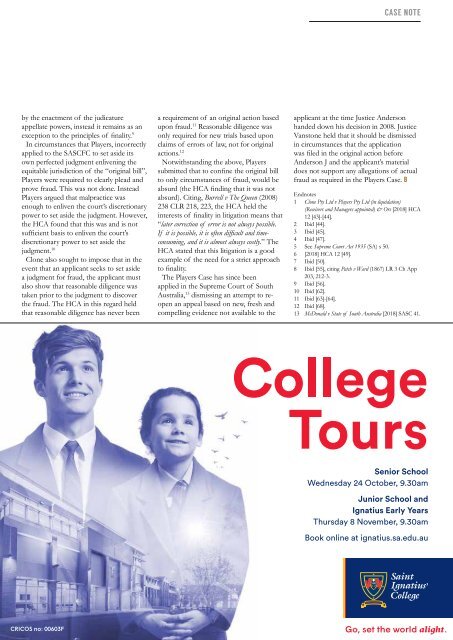LSB September 2018_Web
You also want an ePaper? Increase the reach of your titles
YUMPU automatically turns print PDFs into web optimized ePapers that Google loves.
CASE NOTE<br />
by the enactment of the judicature<br />
appellate powers, instead it remains as an<br />
exception to the principles of finality. 9<br />
In circumstances that Players, incorrectly<br />
applied to the SASCFC to set aside its<br />
own perfected judgment enlivening the<br />
equitable jurisdiction of the “original bill”,<br />
Players were required to clearly plead and<br />
prove fraud. This was not done. Instead<br />
Players argued that malpractice was<br />
enough to enliven the court’s discretionary<br />
power to set aside the judgment. However,<br />
the HCA found that this was and is not<br />
sufficient basis to enliven the court’s<br />
discretionary power to set aside the<br />
judgment. 10<br />
Clone also sought to impose that in the<br />
event that an applicant seeks to set aside<br />
a judgment for fraud, the applicant must<br />
also show that reasonable diligence was<br />
taken prior to the judgment to discover<br />
the fraud. The HCA in this regard held<br />
that reasonable diligence has never been<br />
a requirement of an original action based<br />
upon fraud. 11 Reasonable diligence was<br />
only required for new trials based upon<br />
claims of errors of law, not for original<br />
actions. 12<br />
Notwithstanding the above, Players<br />
submitted that to confine the original bill<br />
to only circumstances of fraud, would be<br />
absurd (the HCA finding that it was not<br />
absurd). Citing, Burrell v The Queen (2008)<br />
238 CLR 218, 223, the HCA held the<br />
interests of finality in litigation means that<br />
“later correction of error is not always possible.<br />
If it is possible, it is often difficult and timeconsuming,<br />
and it is almost always costly.” The<br />
HCA stated that this litigation is a good<br />
example of the need for a strict approach<br />
to finality.<br />
The Players Case has since been<br />
applied in the Supreme Court of South<br />
Australia, 13 dismissing an attempt to reopen<br />
an appeal based on new, fresh and<br />
compelling evidence not available to the<br />
applicant at the time Justice Anderson<br />
handed down his decision in 2008. Justice<br />
Vanstone held that it should be dismissed<br />
in circumstances that the application<br />
was filed in the original action before<br />
Anderson J and the applicant’s material<br />
does not support any allegations of actual<br />
fraud as required in the Players Case. B<br />
Endnotes<br />
1 Clone Pty Ltd v Players Pty Ltd (in liquidation)<br />
(Receivers and Managers appointed) & Ors [<strong>2018</strong>] HCA<br />
12 [43]-[44].<br />
2 Ibid [44].<br />
3 Ibid [45].<br />
4 Ibid [47].<br />
5 See Supreme Court Act 1935 (SA) s 50.<br />
6 [<strong>2018</strong>] HCA 12 [49].<br />
7 Ibid [50].<br />
8 Ibid [55], citing Patch v Ward (1867) LR 3 Ch App<br />
203, 212-3.<br />
9 Ibid [56].<br />
10 Ibid [62].<br />
11 Ibid [63]-[64].<br />
12 Ibid [68].<br />
13 McDonald v State of South Australia [<strong>2018</strong>] SASC 41.


















